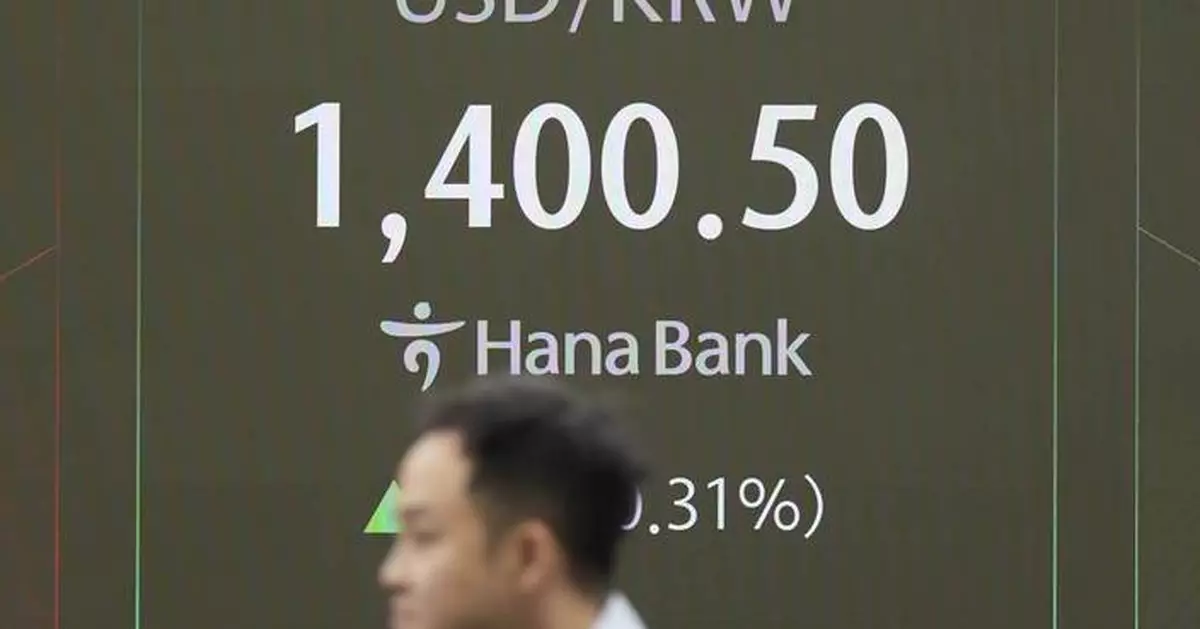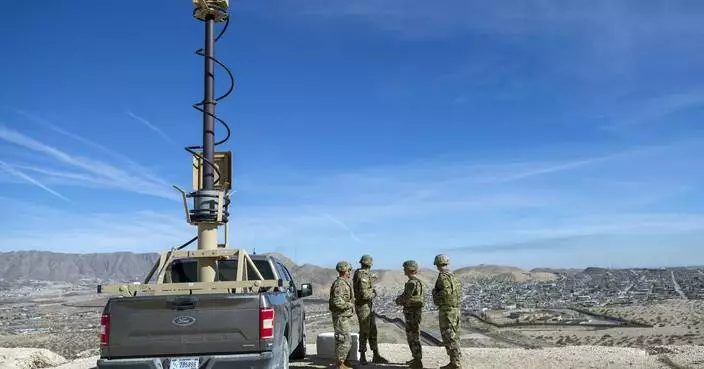NEW YORK (AP) — Most U.S. stocks rose Thursday, as the Federal Reserve cut interest rates again to make things easier for the economy.
The S&P 500 climbed 0.7% to add to its surge from the day before following Donald Trump’s presidential victory. The Dow Jones Industrial Average was virtually unchanged and edged down by less than a point, while the Nasdaq composite rallied 1.5%.
Click to Gallery
A pair of traders work on the floor of the New York Stock Exchange, Thursday, Nov. 7, 2024, in New York, as Federal Reserve Chair Jerome Powell news conference in Washington is displayed on a monitor. (AP Photo/Richard Drew)
A specialist works at his post on the floor of the New York Stock Exchange, Thursday, Nov. 7, 2024. (AP Photo/Richard Drew)
Specialist Michael Pistillo works on the floor of the New York Stock Exchange, Thursday, Nov. 7, 2024. (AP Photo/Richard Drew)
Trader Christopher Lagana is reflected in one of his monitors as he works on the floor of the New York Stock Exchange, Thursday, Nov. 7, 2024. (AP Photo/Richard Drew)
A screen on the floor of the New York Stock Exchange shows the Federal Reserve rate decision, Thursday, Nov. 7, 2024. (AP Photo/Richard Drew)
A board above the trading floor of the New York Stock Exchange shows the closing number for the Dow Jones industrial average, Wednesday, Nov. 6, 2024. (AP Photo/Richard Drew)
Trader Edward McCarthy works on the floor of the New York Stock Exchange, Wednesday, Nov. 6, 2024. (AP Photo/Richard Drew)
A man passes a video monitor on the side of the New York Stock Exchange in New York's Financial District on Tuesday, Nov. 5, 2024. (AP Photo/Peter Morgan)
A board above the trading floor of the New York Stock Exchange shows the closing number for the Dow Jones industrial average, Wednesday, Nov. 6, 2024. (AP Photo/Richard Drew)
People pass the New York Stock Exchange in New York's Financial District on Tuesday, Nov. 5, 2024. (AP Photo/Peter Morgan)
A TV camera screen shows the foreign exchange rate between U.S. dollar and South Korean won and the Korean Securities Dealers Automated Quotations (KOSDAQ) at a foreign exchange dealing room in Seoul, South Korea, Thursday, Nov. 7, 2024. (AP Photo/Lee Jin-man)
Members of media stand near the screens showing the Korea Composite Stock Price Index (KOSPI), left, the foreign exchange rate between U.S. dollar and South Korean won and the Korean Securities Dealers Automated Quotations (KOSDAQ) at a foreign exchange dealing room in Seoul, South Korea, Thursday, Nov. 7, 2024. (AP Photo/Lee Jin-man)
A currency trader talks on the phone at a foreign exchange dealing room in Seoul, South Korea, Thursday, Nov. 7, 2024. (AP Photo/Lee Jin-man)
A tv cameraman films the screens showing the Korea Composite Stock Price Index (KOSPI), left, and the foreign exchange rate between U.S. dollar and South Korean won at a foreign exchange dealing room in Seoul, South Korea, Thursday, Nov. 7, 2024. (AP Photo/Lee Jin-man)
A currency trader walks by the screens showing the Korea Composite Stock Price Index (KOSPI), left, and the foreign exchange rate between U.S. dollar and South Korean won at a foreign exchange dealing room in Seoul, South Korea, Thursday, Nov. 7, 2024. (AP Photo/Lee Jin-man)
A currency trader walks by the screens showing the foreign exchange rate between U.S. dollar and South Korean won at a foreign exchange dealing room in Seoul, South Korea, Thursday, Nov. 7, 2024. (AP Photo/Lee Jin-man)
The Fed’s announcement that it was easing its main interest rate caused few ripples in the market because even the precise size of it was so well anticipated by investors.
The central bank began easing rates in September and indicated more cuts were likely to come, as it focuses more on keeping the job market humming after helping get inflation nearly down to its 2% target. What’s less certain in the minds of investors now is how much Trump’s victory may upset the Fed’s plans.
Trump is pushing for tariffs and other policies that economists say could drive inflation higher, along with the economy’s growth. Traders have already begun paring forecasts for how many cuts to rates the Fed will deliver next year because of that. While lower rates can boost the economy, they can also give inflation more fuel.
For now, Fed Chair Jerome Powell said, nothing is changing. “In the near term, the election will have no effects” on interest-rate policy, he said.
With any president, Powell said the Fed looks at possible policy changes and simulates how they could affect the economy. Only after looking at the overall effect of all the policies do Fed officials decide how that should shape where interest rates go. And at this point, Powell said it’s still not clear what the policies will be after Trump returns to the White House.
“We don’t guess, we don’t speculate and we don’t assume,” he said.
On Wall Street, healthcare services company McKesson helped drive the market by jumping 10.6% after reporting a stronger profit for the latest quarter than analysts expected.
Lyft revved up by 22.8% after the ride-hailing app breezed past Wall Street’s sales and profit expectations, and Ralph Lauren rose 6.6% after customers in Asia and Europe helped it deliver a bigger profit than expected.
They helped make up for bank stocks, which gave back some of their stellar gains from the day before. Other “Trump trades” that had rocketed higher after the election also lost some of their juice.
JPMorgan Chase fell 4.3%, a day after banks decisively led the market on expectations that a stronger economy and lighter regulation would mean fatter profits. It and Goldman Sachs were the biggest reasons for the Dow Jones Industrial Average's slight loss.
Smaller U.S. stocks also lagged the market, with the Russell 2000 index down 0.4%. A day before, it more than doubled the S&P 500’s gain on expectations that Trump’s America-First priorities would most benefit smaller, more domestically focused companies.
The stock that’s become most synonymous with the president-elect, Trump Media & Technology Group, fell 23%.
All told, the S&P 500 rose 44.06 points to 5,973.10. The Dow edged down by 0.59 to 43,729.34, and the Nasdaq composite gained 285.99 to 19,269.46.
In the bond market, the yield on the 10-year Treasury eased to 4.33% from 4.44% late Wednesday. It gave back a chunk of its surge from the prior day, driven by expectations that Trump’s plans for higher tariffs, lower tax rates and lighter regulation could lead to bigger economic growth, U.S. government debt and inflation.
A report on Thursday showed slightly more U.S. workers applied for unemployment benefits, though the number remains relatively low. A separate report suggested U.S. workers improved their productivity during the summer, which can help keep a lid on inflation, but not by quite as much as economists expected.
In stock markets abroad, London’s FTSE 100 fell 0.3% after the Bank of England cut its own interest rate by a quarter of a percentage point.
In Asia, Japan’s Nikkei 225 slipped 0.3% amid worries about the potential for a revival of trade tensions under a Trump administration.
“I think everybody’s going to be worried about Trump’s tariffs because that’s one of the things in his playbook. And so we’ll have to see how things develop in the early stages of his presidency this time,” said Neil Newman, head of strategy for Astris Advisory Japan.
Stocks rallied 2% in Hong Kong and 2.6% in Shanghai rallied after the Chinese government reported exports jumped in October at the fastest pace in more than two years.
Trump has promised to slap blanket 60% tariffs on all Chinese imports, raising them still more if Beijing makes a move to invade the self-governing island of Taiwan. That would add to the burdens Beijing is facing as it struggles to revive slowing growth in the world’s second-largest economy.
But the impact may be less drastic than feared, Zichun Huang of Capital Economics said in a report.
“We expect shipments to stay strong in the coming months –- any drag from potential Trump tariffs may not materialize until the second half of next year,” Huang said.
AP Business Writers Matt Ott and Elaine Kurtenbach contributed to this report.
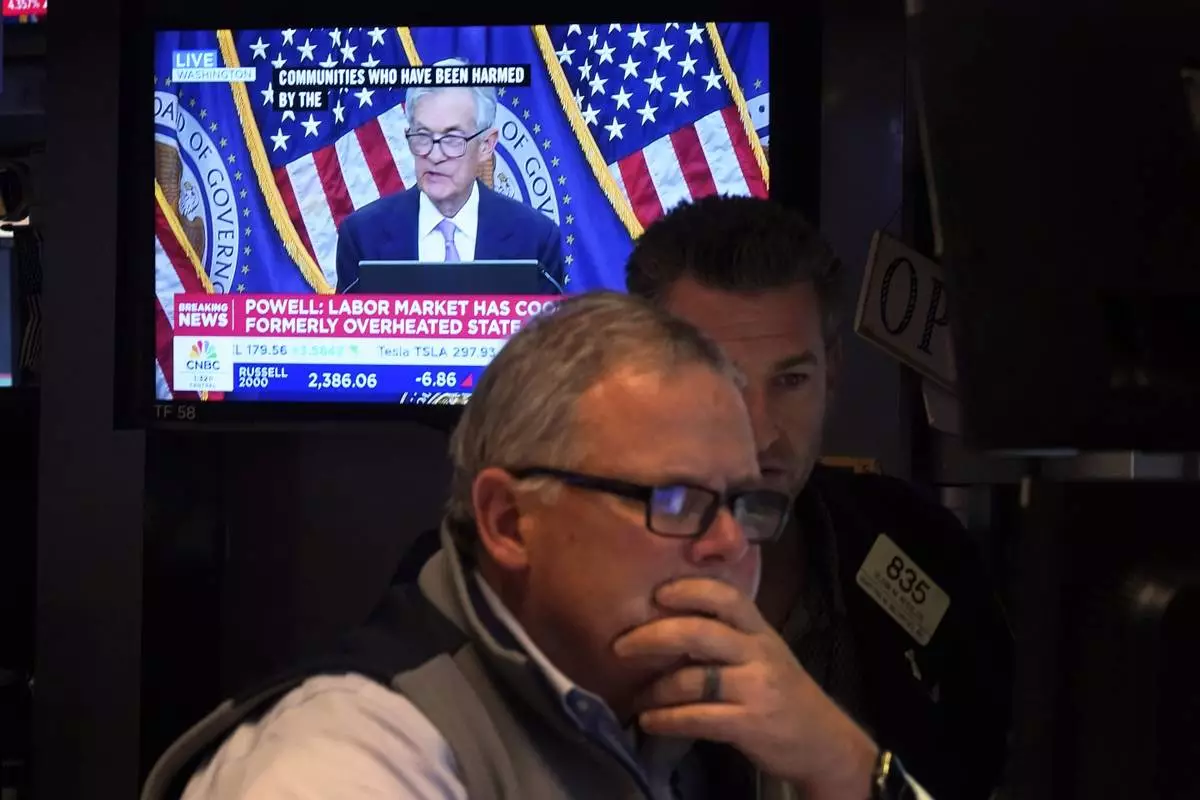
A pair of traders work on the floor of the New York Stock Exchange, Thursday, Nov. 7, 2024, in New York, as Federal Reserve Chair Jerome Powell news conference in Washington is displayed on a monitor. (AP Photo/Richard Drew)
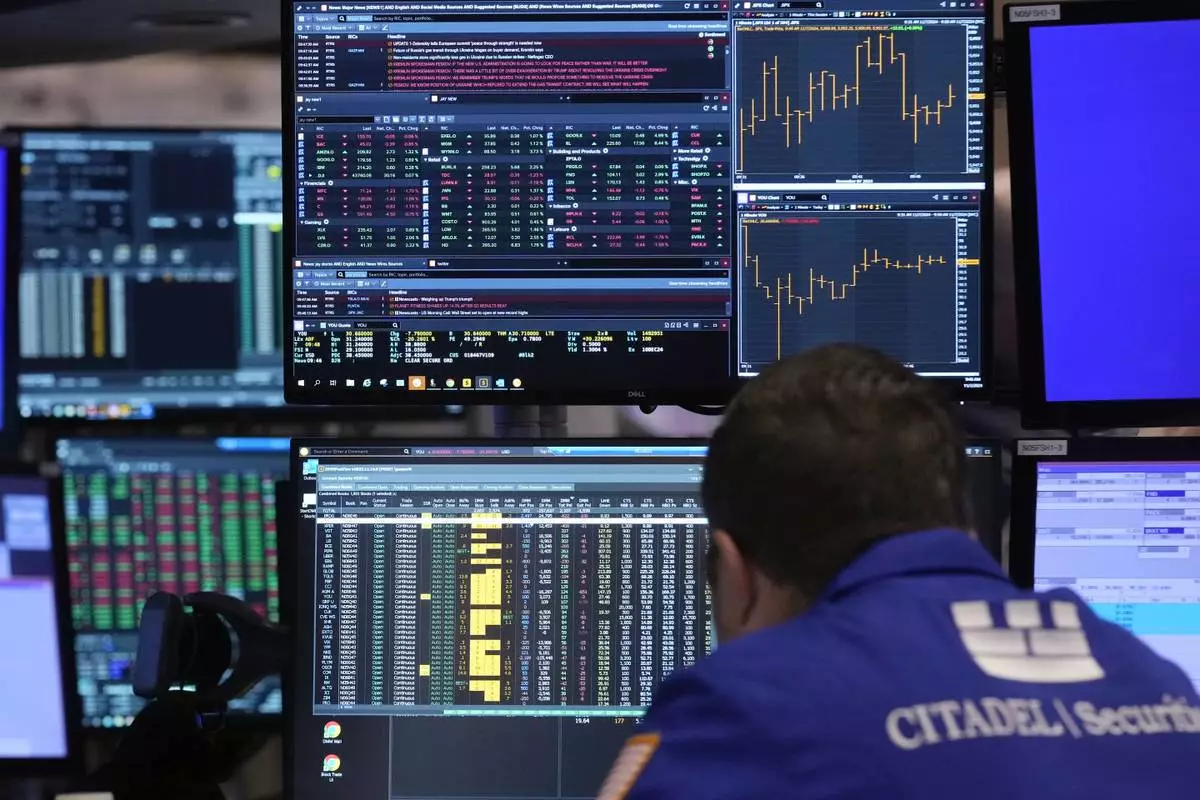
A specialist works at his post on the floor of the New York Stock Exchange, Thursday, Nov. 7, 2024. (AP Photo/Richard Drew)
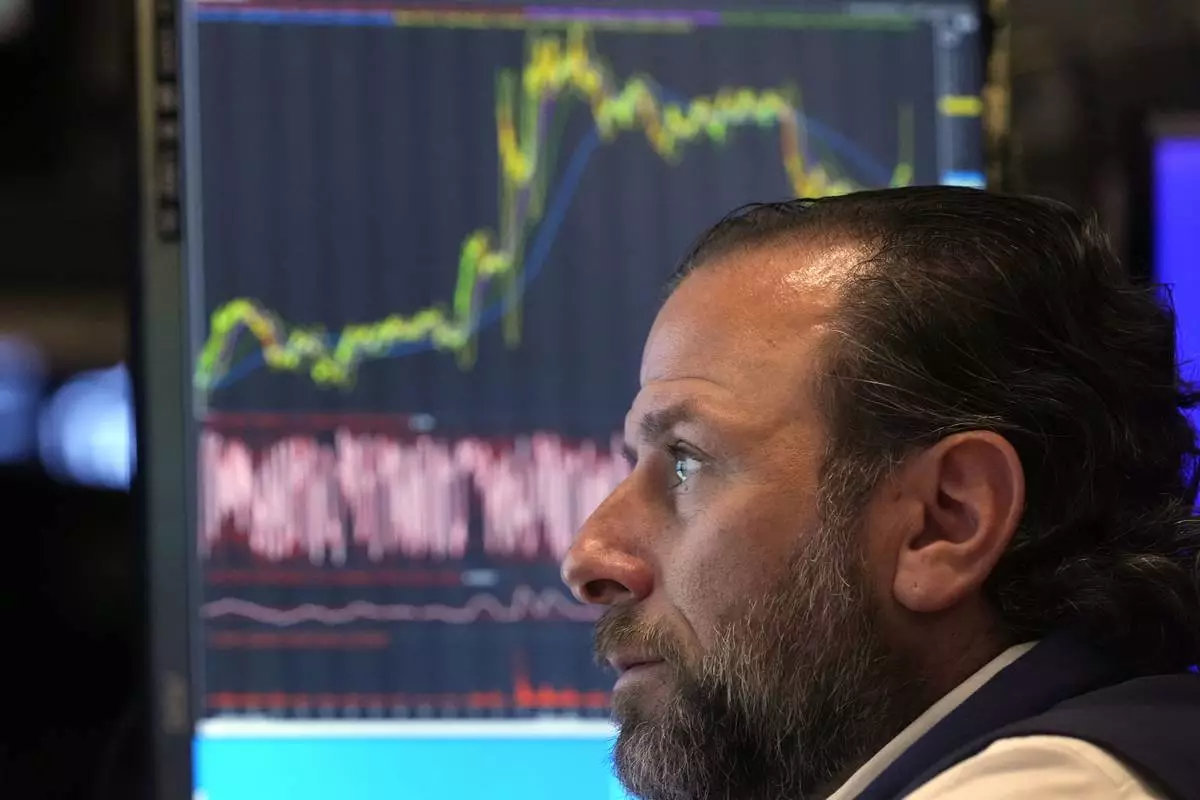
Specialist Michael Pistillo works on the floor of the New York Stock Exchange, Thursday, Nov. 7, 2024. (AP Photo/Richard Drew)
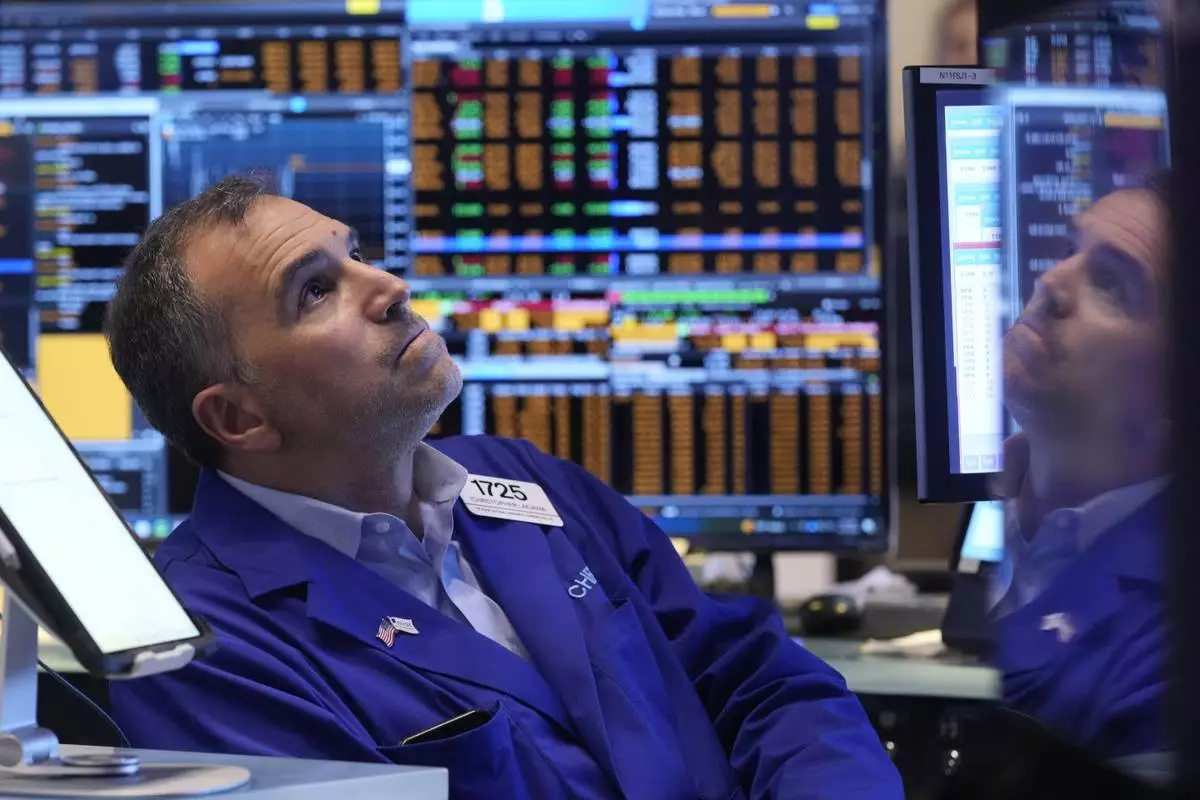
Trader Christopher Lagana is reflected in one of his monitors as he works on the floor of the New York Stock Exchange, Thursday, Nov. 7, 2024. (AP Photo/Richard Drew)
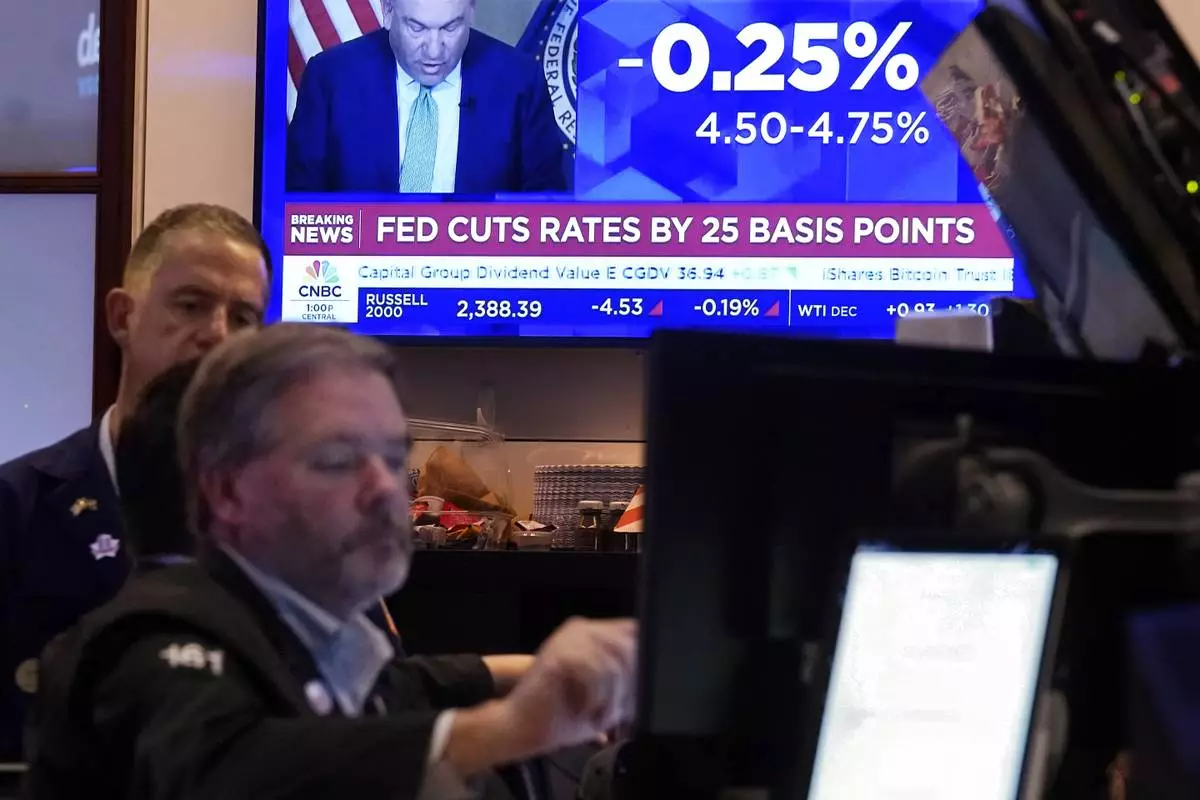
A screen on the floor of the New York Stock Exchange shows the Federal Reserve rate decision, Thursday, Nov. 7, 2024. (AP Photo/Richard Drew)
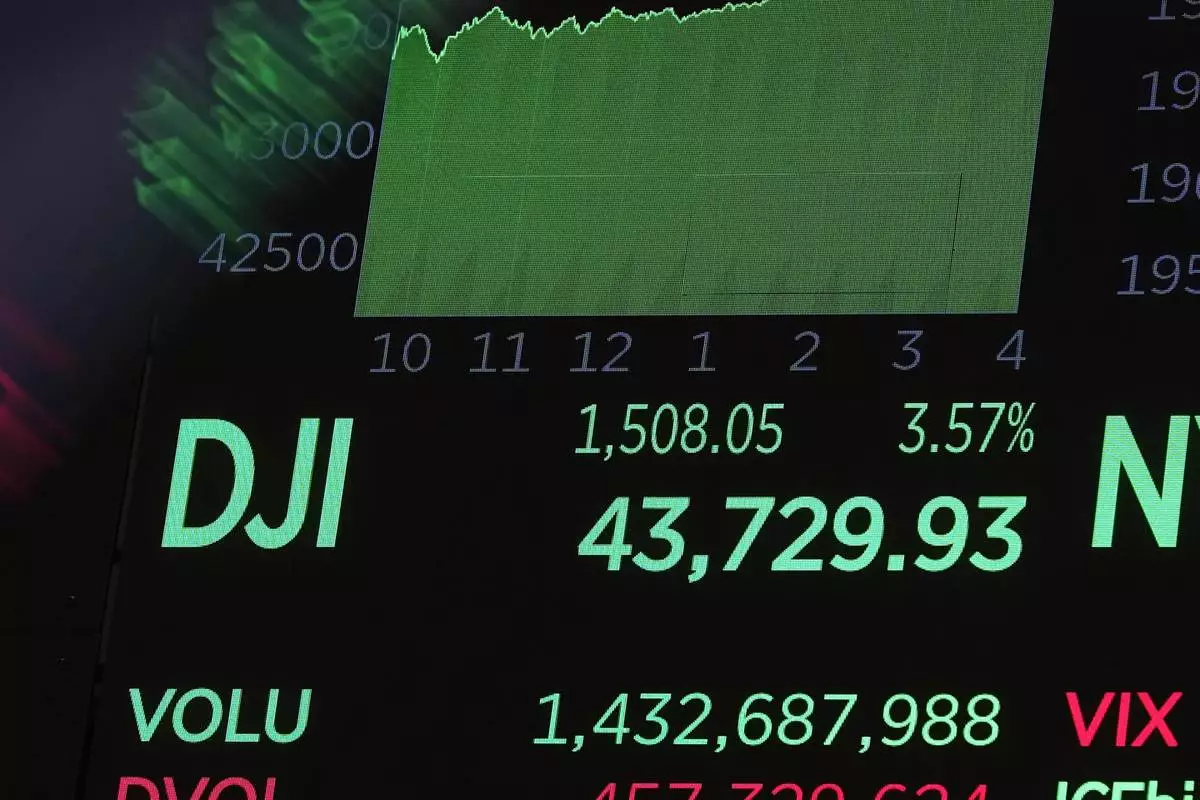
A board above the trading floor of the New York Stock Exchange shows the closing number for the Dow Jones industrial average, Wednesday, Nov. 6, 2024. (AP Photo/Richard Drew)
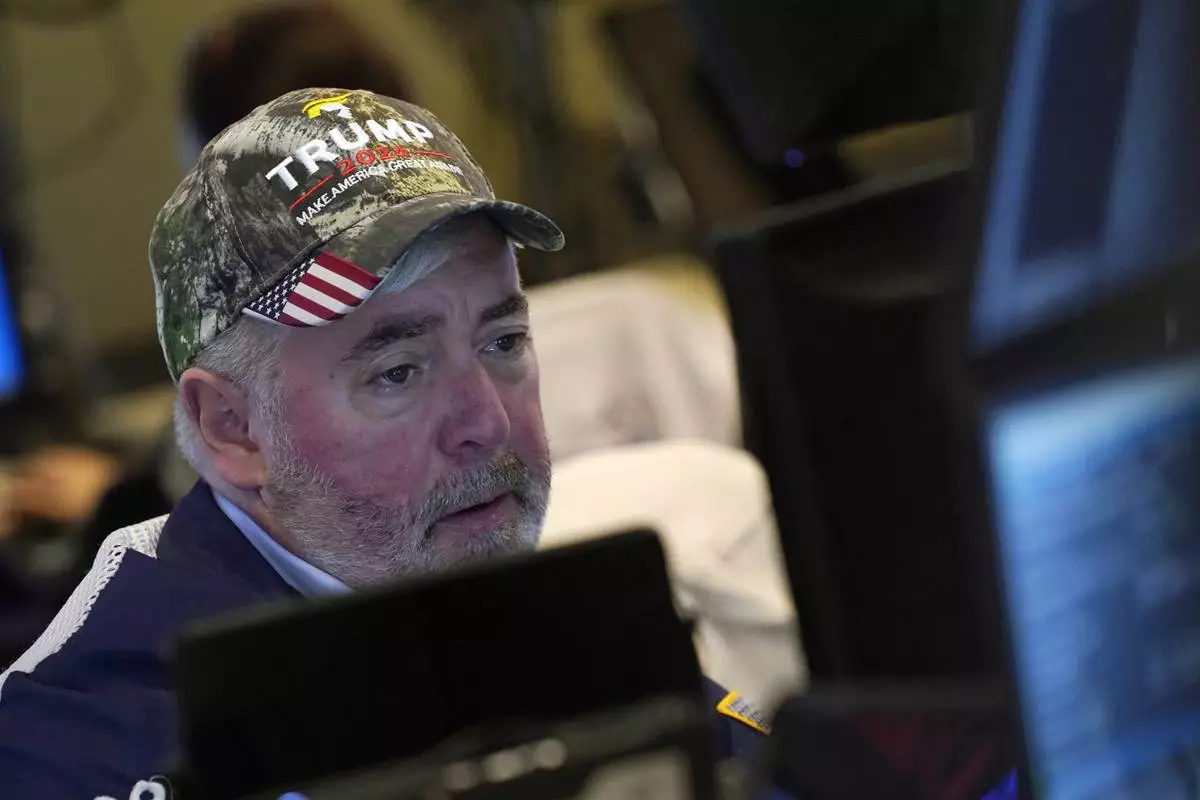
Trader Edward McCarthy works on the floor of the New York Stock Exchange, Wednesday, Nov. 6, 2024. (AP Photo/Richard Drew)
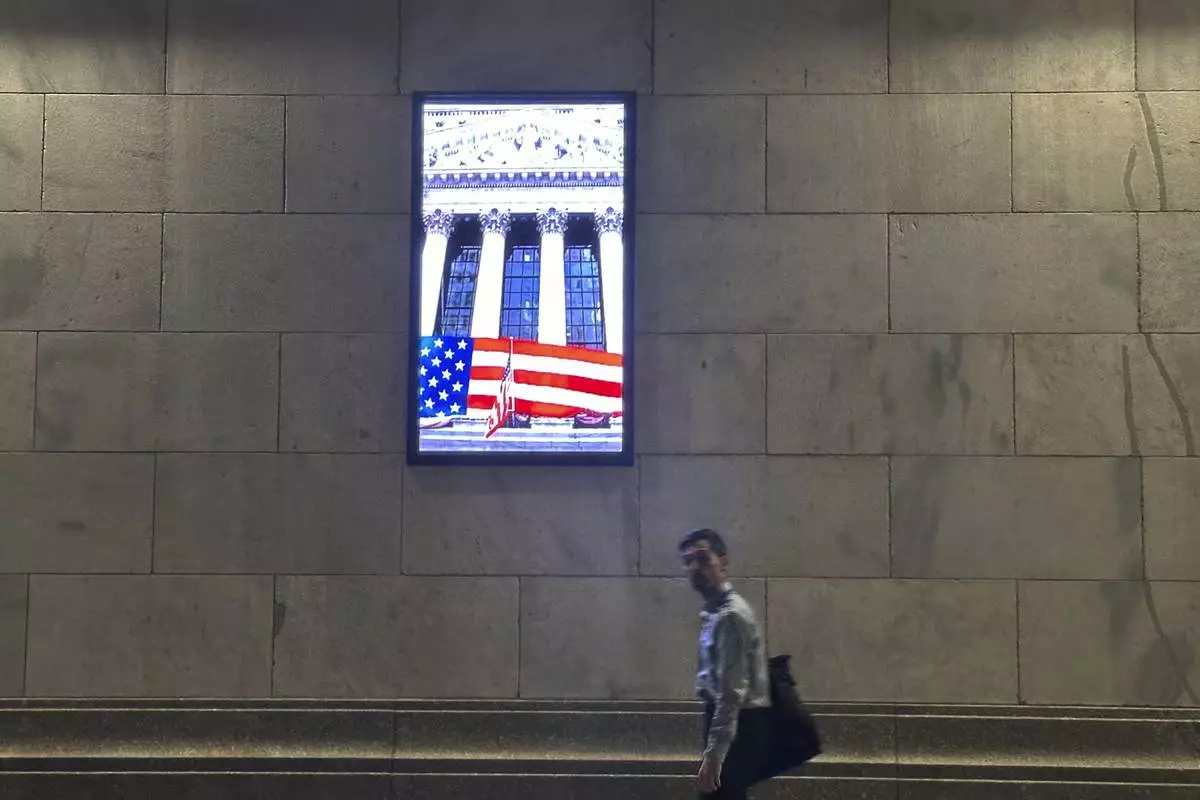
A man passes a video monitor on the side of the New York Stock Exchange in New York's Financial District on Tuesday, Nov. 5, 2024. (AP Photo/Peter Morgan)
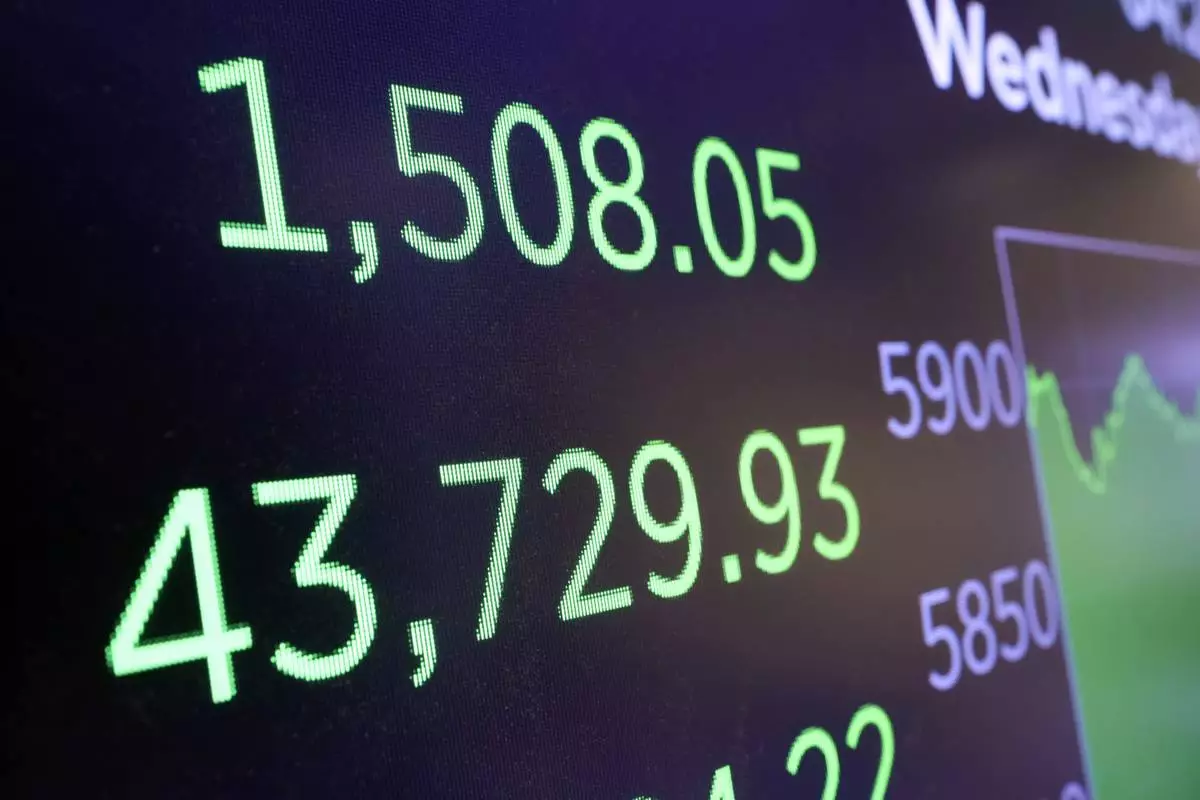
A board above the trading floor of the New York Stock Exchange shows the closing number for the Dow Jones industrial average, Wednesday, Nov. 6, 2024. (AP Photo/Richard Drew)
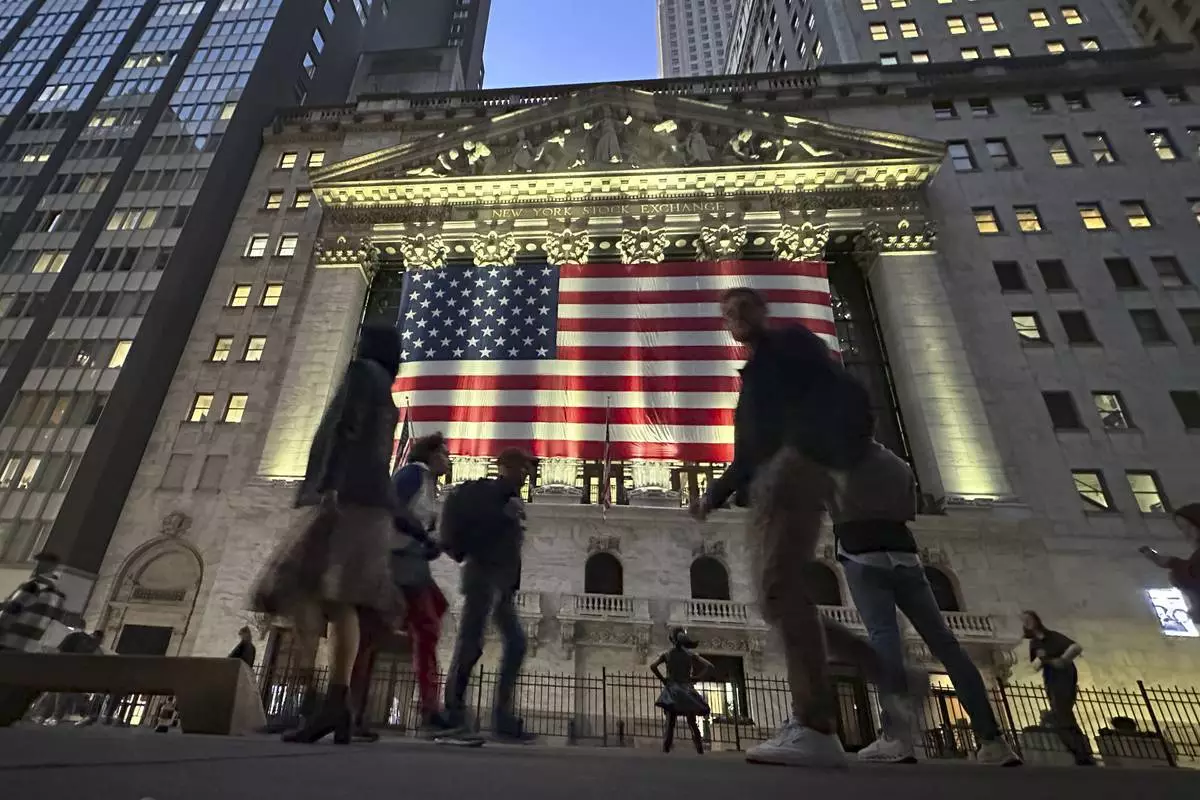
People pass the New York Stock Exchange in New York's Financial District on Tuesday, Nov. 5, 2024. (AP Photo/Peter Morgan)
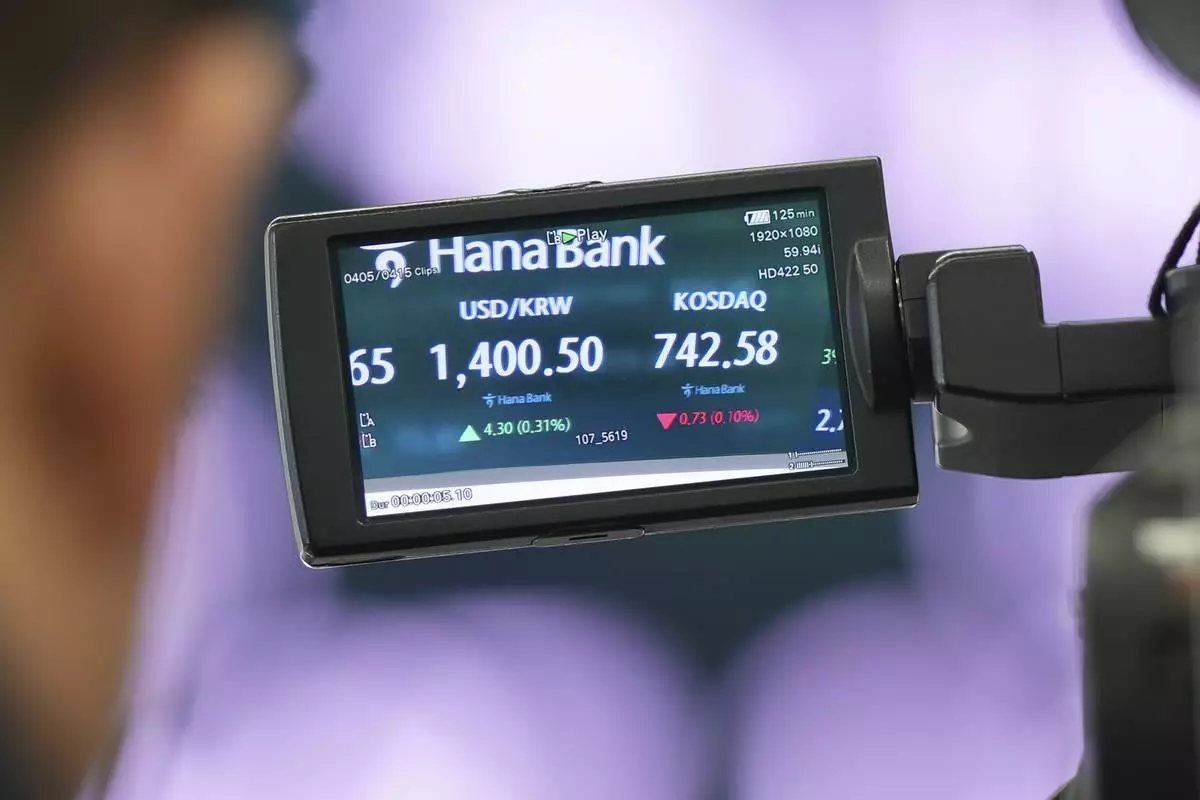
A TV camera screen shows the foreign exchange rate between U.S. dollar and South Korean won and the Korean Securities Dealers Automated Quotations (KOSDAQ) at a foreign exchange dealing room in Seoul, South Korea, Thursday, Nov. 7, 2024. (AP Photo/Lee Jin-man)
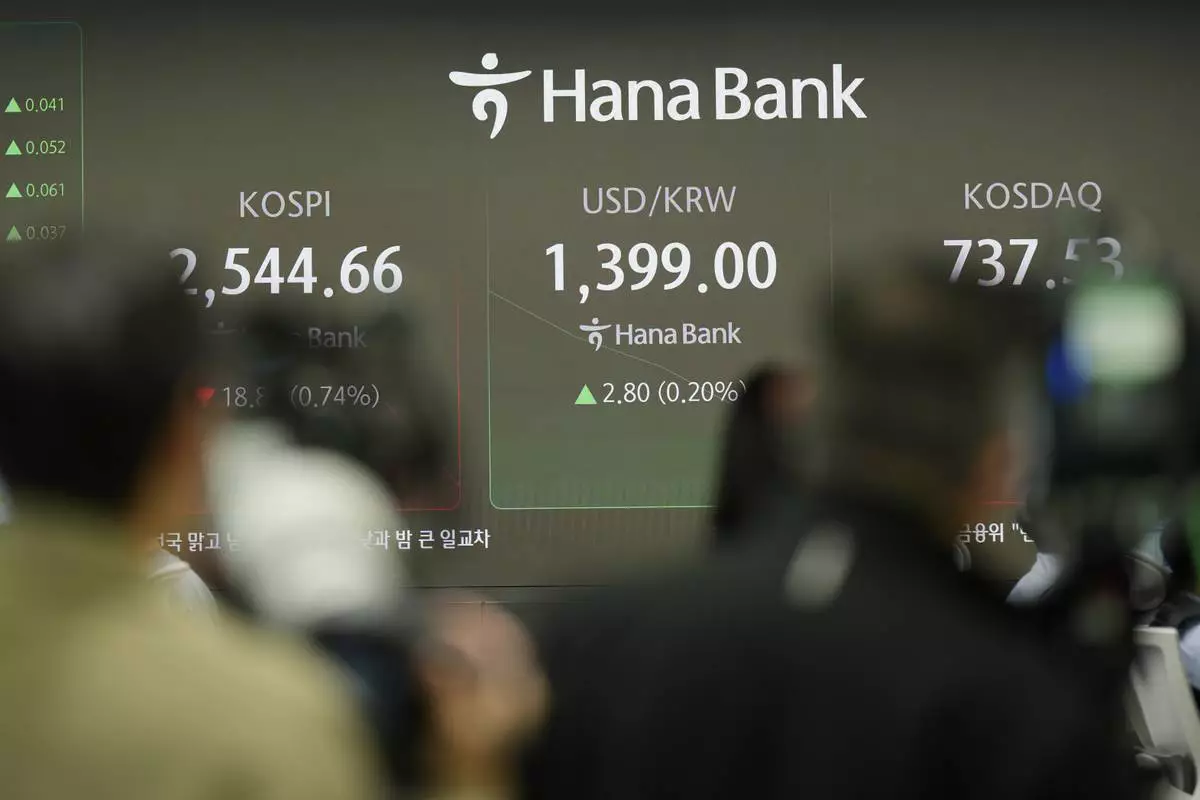
Members of media stand near the screens showing the Korea Composite Stock Price Index (KOSPI), left, the foreign exchange rate between U.S. dollar and South Korean won and the Korean Securities Dealers Automated Quotations (KOSDAQ) at a foreign exchange dealing room in Seoul, South Korea, Thursday, Nov. 7, 2024. (AP Photo/Lee Jin-man)
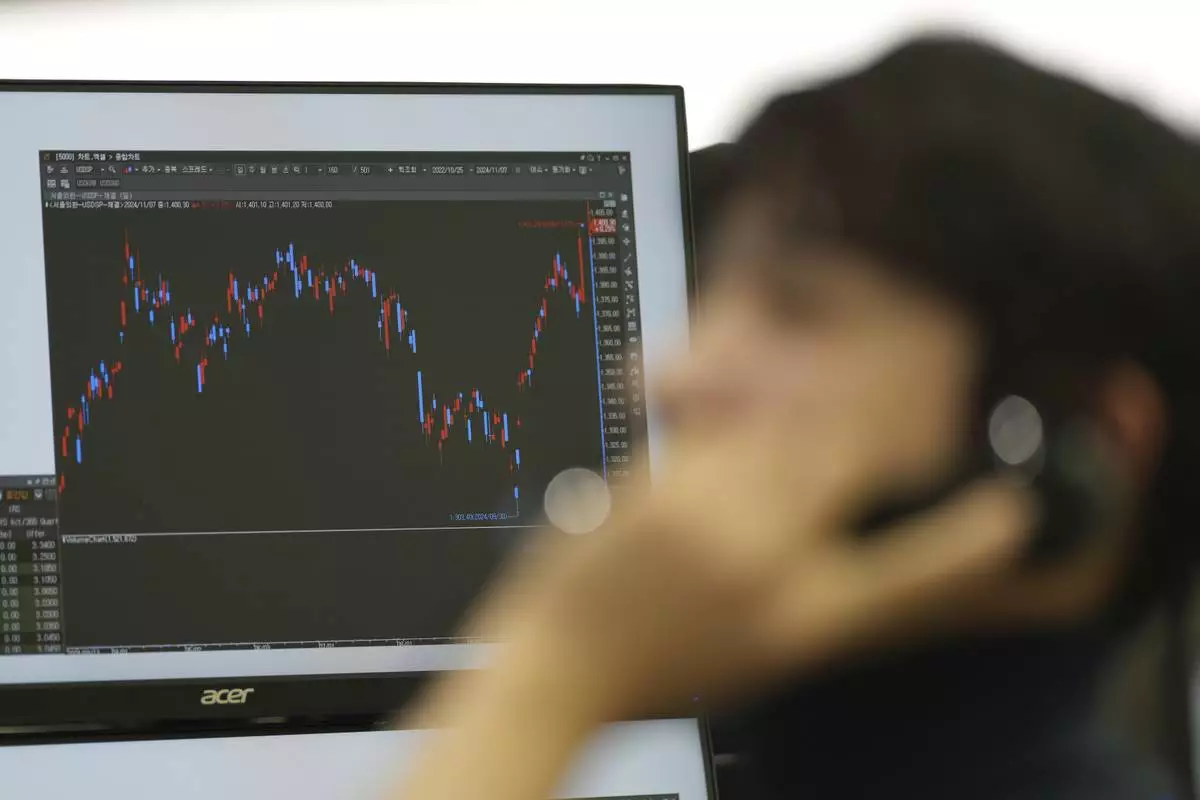
A currency trader talks on the phone at a foreign exchange dealing room in Seoul, South Korea, Thursday, Nov. 7, 2024. (AP Photo/Lee Jin-man)
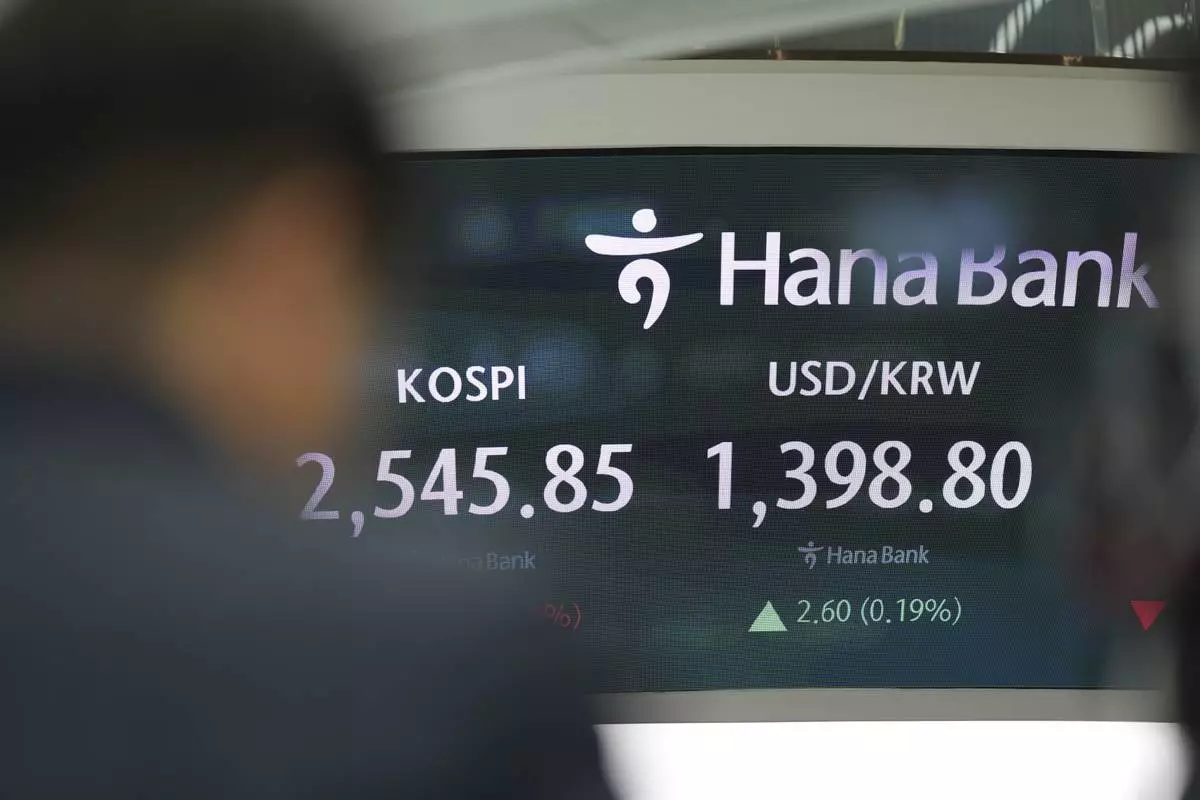
A tv cameraman films the screens showing the Korea Composite Stock Price Index (KOSPI), left, and the foreign exchange rate between U.S. dollar and South Korean won at a foreign exchange dealing room in Seoul, South Korea, Thursday, Nov. 7, 2024. (AP Photo/Lee Jin-man)
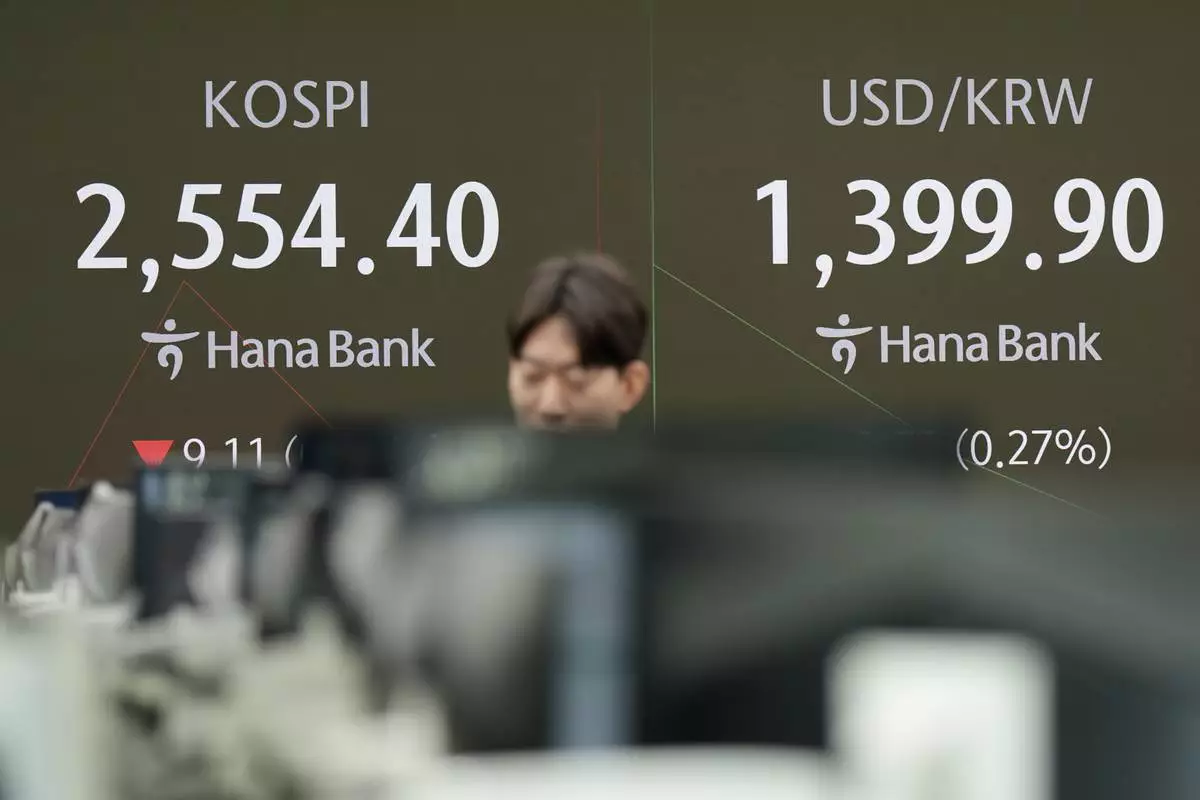
A currency trader walks by the screens showing the Korea Composite Stock Price Index (KOSPI), left, and the foreign exchange rate between U.S. dollar and South Korean won at a foreign exchange dealing room in Seoul, South Korea, Thursday, Nov. 7, 2024. (AP Photo/Lee Jin-man)
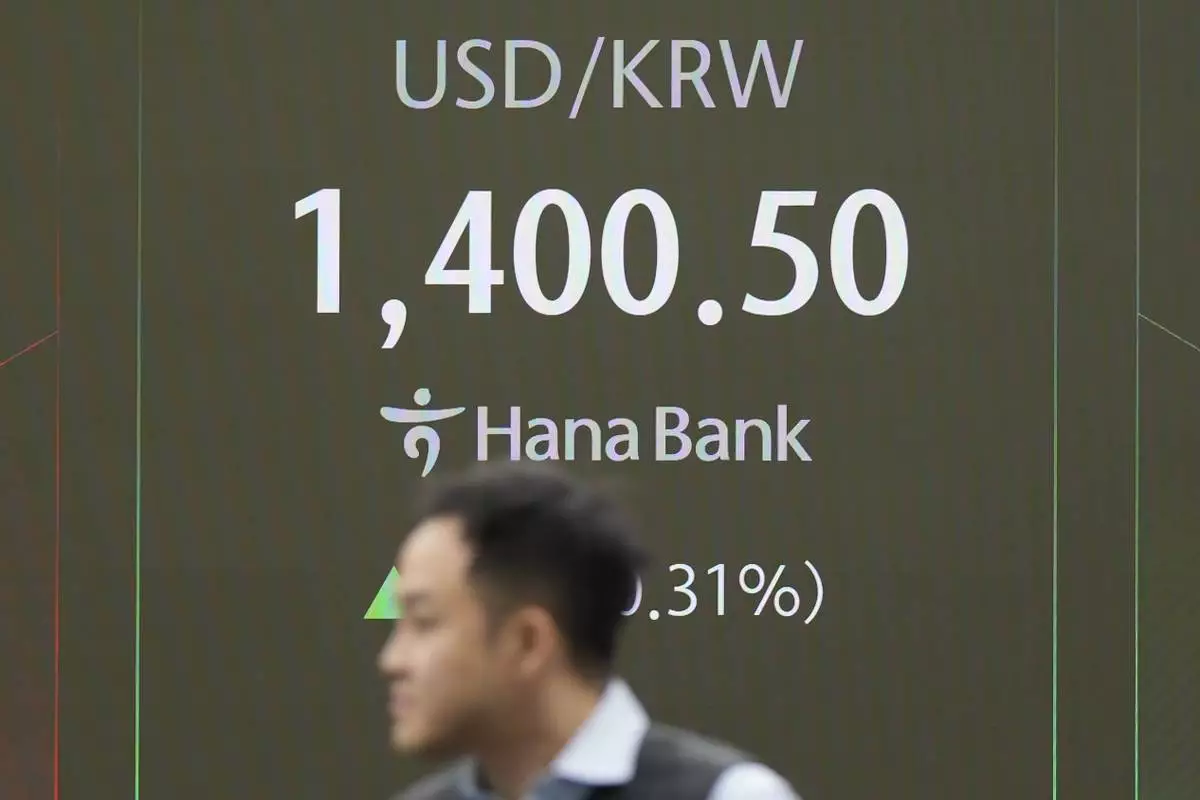
A currency trader walks by the screens showing the foreign exchange rate between U.S. dollar and South Korean won at a foreign exchange dealing room in Seoul, South Korea, Thursday, Nov. 7, 2024. (AP Photo/Lee Jin-man)
DEIR AL-BALAH, Gaza Strip (AP) — Israel launched dozens of airstrikes across Gaza on Friday that local health officials said killed 108 people, mostly women and children, and which Israeli officials described as a prelude to a stepped-up campaign to pressure Hamas to release hostages.
Israel also struck two ports in Yemen that it said were used by the Houthi militant group to transfer weapons. Local health officials said at least one person was killed and nine injured.
The strikes across the Gaza Strip followed days of attacks that killed more than 130 people, according to Gaza’s Health Ministry, which does not distinguish between civilians and combatants, and came as U.S. President Donald Trump wrapped up a visit to the region that included stops in three Gulf states but not Israel.
There had been widespread hope that Trump's trip could increase the chances of a ceasefire deal or the resumption of humanitarian aid to Gaza, which Israel has prevented for more than two months. The Trump administration is also trying to negotiate a nuclear deal with Iran, which backs several anti-Israel militant groups, including Hamas in Gaza and the Houthis in Yemen.
Speaking to reporters in Abu Dhabi on the final day of his trip, Trump said he was looking to resolve a range of global crises, including Gaza. “We’re looking at Gaza,” he said. “And we’ve got to get that taken care of. A lot of people are starving. A lot of people are — there’s a lot of bad things going on.”
The Gaza Health Ministry said 31 children and 27 women were killed and hundreds more wounded in Friday’s airstrikes.
In southern Gaza, Israel struck the outskirts of Deir al-Balah and the city of Khan Younis. It said it hit anti-tank missile posts and military structures.
Three children and their grandfather were killed as they fled bombardment in Khan Younis, said the head of pediatrics at Nasser Hospital, Dr. Ahmed al-Farra.
In northern Gaza, the attacks sent people fleeing from the Jabaliya refugee camp and the town of Beit Lahiya. Israel said it eliminated several militants who were operating in an observation compound.
Dark smoke was seen rising over Jabaliya as people fled on donkey carts, by car and foot.
“We got out of the house with difficulty, killing and death, we did not take anything,” said Feisal Al-Attar, who was displaced from Beit Lahiya.
After the strikes on Yemen, Israeli Prime Minister Benjamin Netanyahu said, “There will be more to come.” The Israeli military, which attacked Houthi targets earlier this month, said it had intercepted several missiles fired from Yemen toward Israeli airspace during Trump’s visit to the region.
An Israeli official said the latest strikes in Gaza were part of the lead-up to a larger operation that it warned would begin soon if Hamas doesn't release the 58 hostages still in Gaza since the group's October 2023 attack that launched the war. The official was not authorized to brief media and spoke on condition of anonymity.
Netanyahu vowed earlier in the week to escalate pressure on Hamas with the aim of destroying the militant group that has ruled Gaza for nearly two decades. In comments released by his office Tuesday, the prime minister said Israeli forces were days away from entering Gaza “with great strength to complete the mission.”
Israeli Defense Minister Israel Katz confirmed Friday that strikes in Gaza earlier in the week targeted the presumed leader of Hamas' military wing in Gaza, Mohammed Sinwar, although there has been no word on his fate. He is the brother of the slain former leader in Gaza, Yahya Sinwar — a mastermind of the Oct. 7, 2023, attack.
In Israel, a group that supports the families of hostages said they awoke Friday with “heavy hearts” to reports of increased attacks and called on Netanyahu to “join hands” with Trump’s efforts to free hostages. On Monday, Israeli-American Edan Alexander was released after backdoor U.S.-Hamas diplomacy.
In the Oct. 7 attack, Hamas-led militants killed 1,200 people and abducted 251 others. Israel’s retaliatory offensive has killed more than 53,000 Palestinians, many of them women and children, according to Gaza’s Health Ministry.
Almost 3,000 have been killed since Israel broke a ceasefire on March 18, the ministry said.
Of the hostages that remain in Gaza, Israel believes as many as 23 are still alive, although Israeli authorities have expressed concern for the status of three of those.
Dozens of Palestinians in Khan Younis lined up at a charity kitchen Friday in a scene that quickly turned chaotic as the enclave entered its third month of Israel’s aid blockade.
Several children behind a metal partition screamed and cried out for food. At one point, charity kitchen workers struggled to push people back into line.
Some workers were attacked as the crowd surged forward, pressing against the partition and lunging toward the large pots of rice to grab whatever they could.
Israel's blockade is preventing food, fuel medicine and all other supplies from entering, worsening a humanitarian crisis. Israel says the blockade aims to pressure Hamas to release the hostages it still holds.
“Our only hope was that Donald Trump’s visit to the Middle East would result in solutions and somehow open crossings to bring in humanitarian assistance as soon as possible into the Gaza Strip,” said Saqer Jamal, a displaced man from Rafah who was at the kitchen.
The United Nations announced Friday that 18 kitchens previously closed due to food shortages in Gaza reopened after community members shared remaining food stocks.
Earlier this week, a new humanitarian organization that has U.S. backing to take over aid delivery said it expects to begin operations before the end of the month — after what it describes as key agreements from Israeli officials.
A statement from the group, the Gaza Humanitarian Foundation, identified several U.S. military veterans, former humanitarian coordinators and security contractors that it said would lead the delivery effort.
Many in the humanitarian community, including the U.N., said they won't participate because the system does not align with humanitarian principles and won't be able to meet the needs of Palestinians in Gaza.
——
Mroue reported from Beirut. Associated Press writers Tia Goldenberg and Sam Mednick in Tel Aviv, Israel, contributed to this report.
——
Follow AP’s war coverage at https://apnews.com/hub/israel-hamas-war
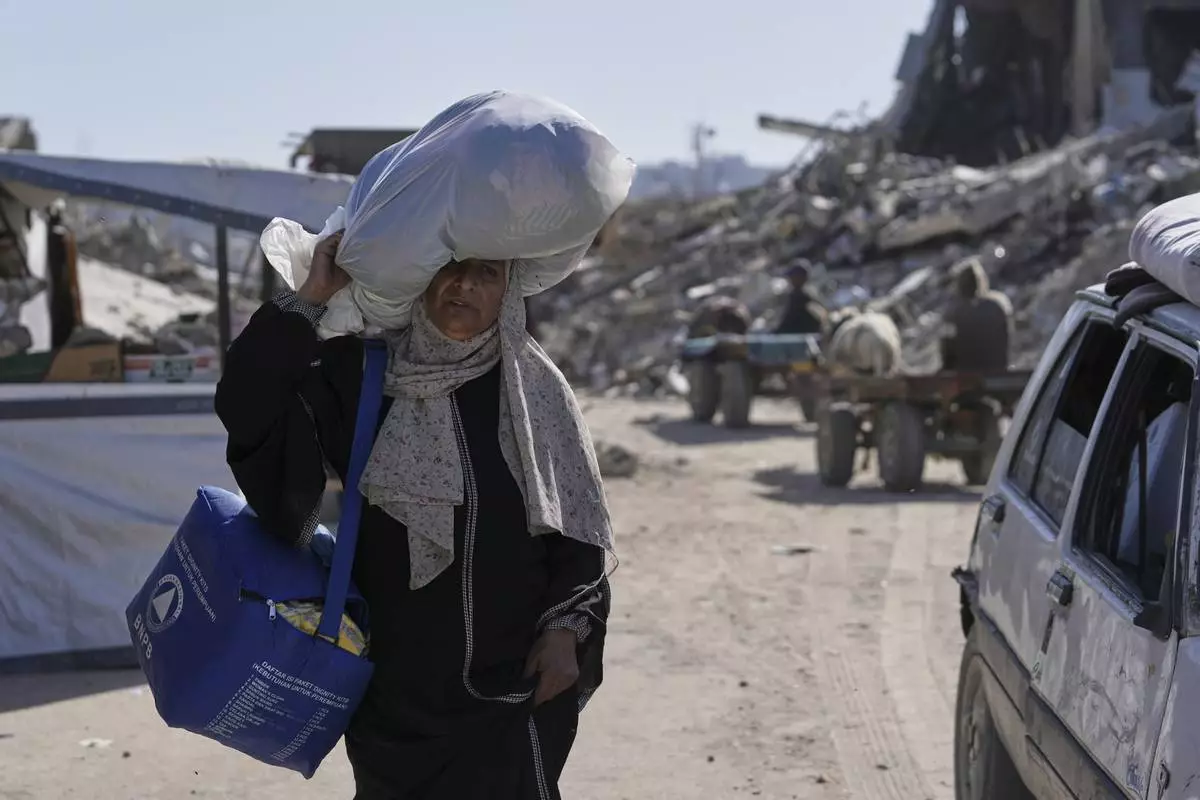
Displaced Palestinians fleeing Beit Lahia amid ongoing Israeli military operations in the Gaza Strip arrive in Jabalia, northern Gaza, on Friday, May 16, 2025. (AP Photo/Jehad Alshrafi)
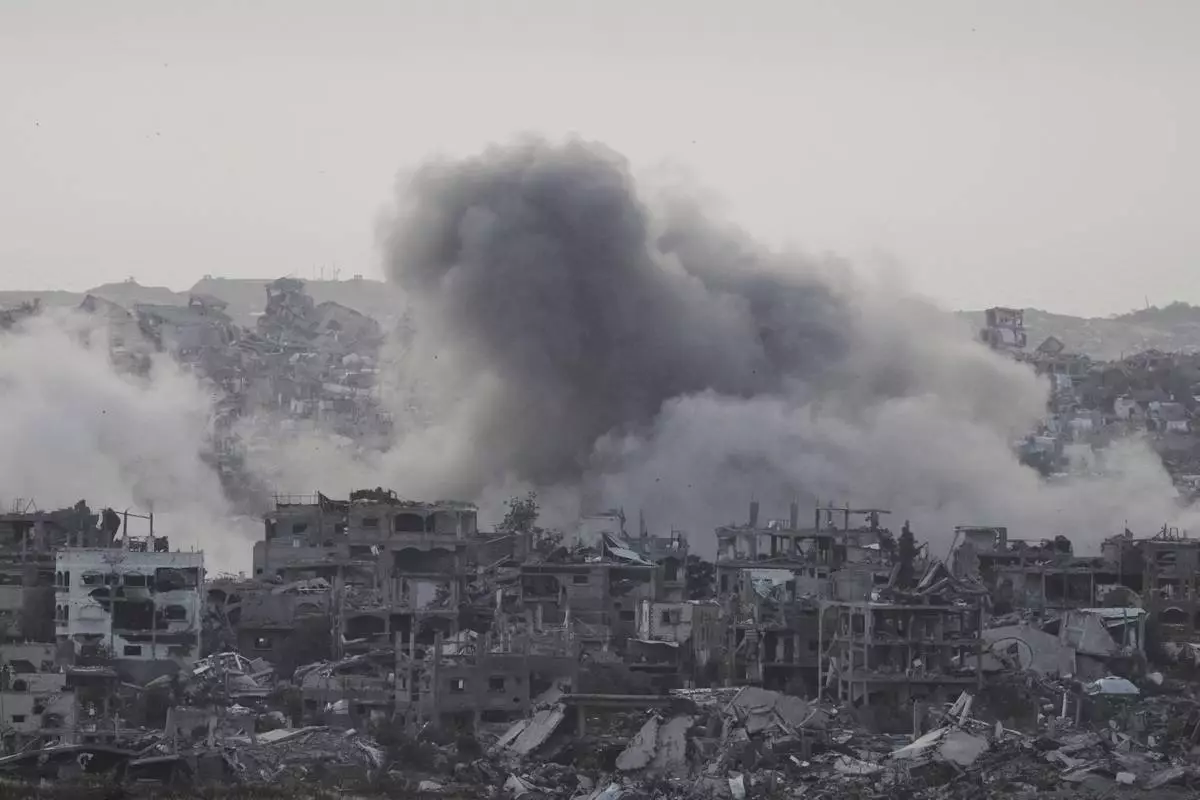
Smoke rises following an Israeli army airstrike in northern Gaza Strip, seen from southern Israel, Friday, May 16, 2025. (AP Photo/Maya Alleruzzo)
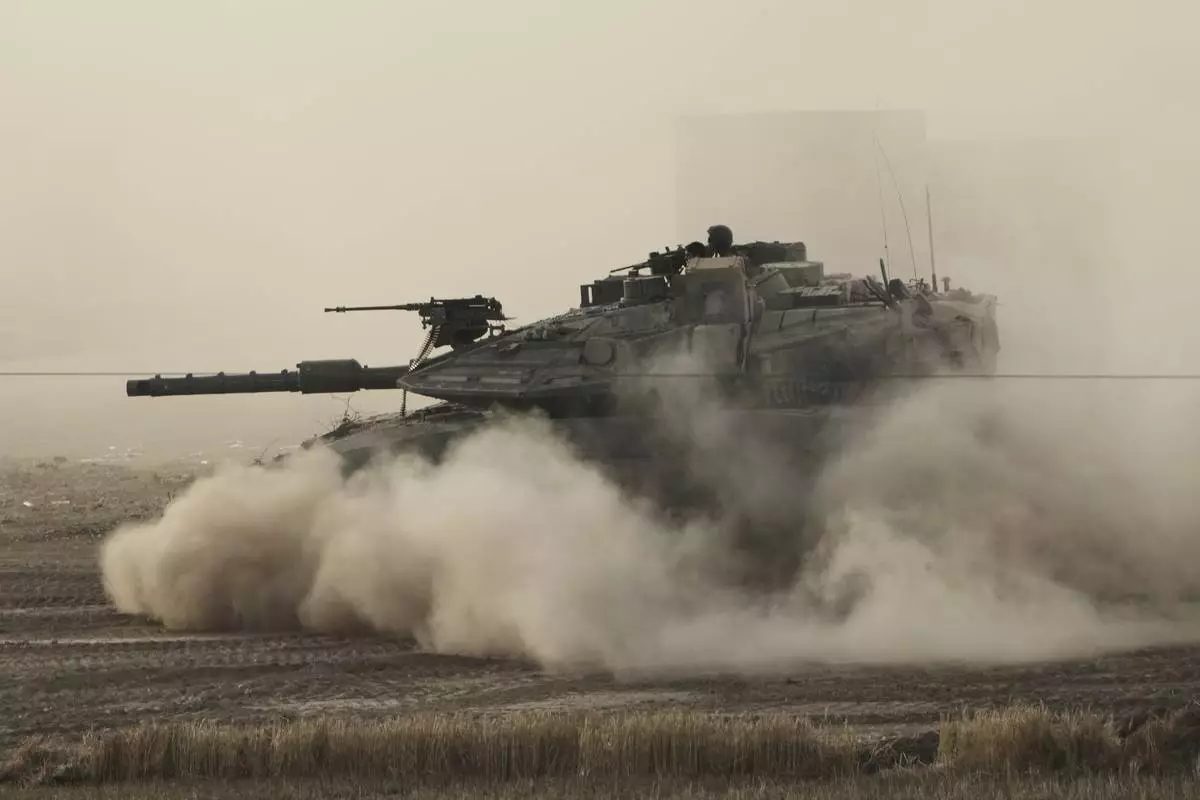
An Israeli tank moves in a staging area in southern Israel, near the border with Gaza, Friday, May 16, 2025. (AP Photo/Maya Alleruzzo)
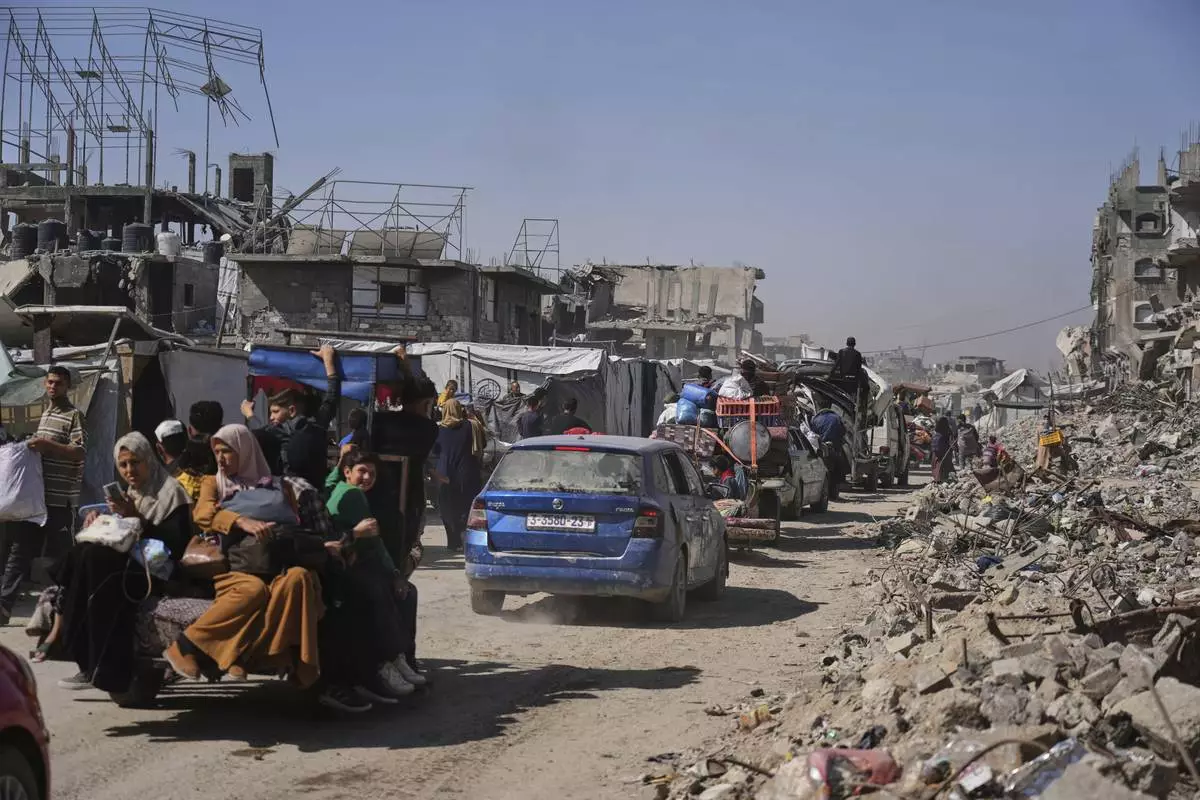
Displaced Palestinians fleeing Beit Lahia amid ongoing Israeli military operations in the Gaza Strip arrive in Jabalia, northern Gaza, on Friday, May 16, 2025. (AP Photo/Jehad Alshrafi)

Palestinians struggle to get donated food at a community kitchen in Khan Younis, Gaza Strip, Friday, May 16, 2025. (AP Photo/Abdel Kareem Hana)

Palestinians struggle to get donated food at a community kitchen in Khan Younis, Gaza Strip, Friday, May 16, 2025. (AP Photo/Abdel Kareem Hana)
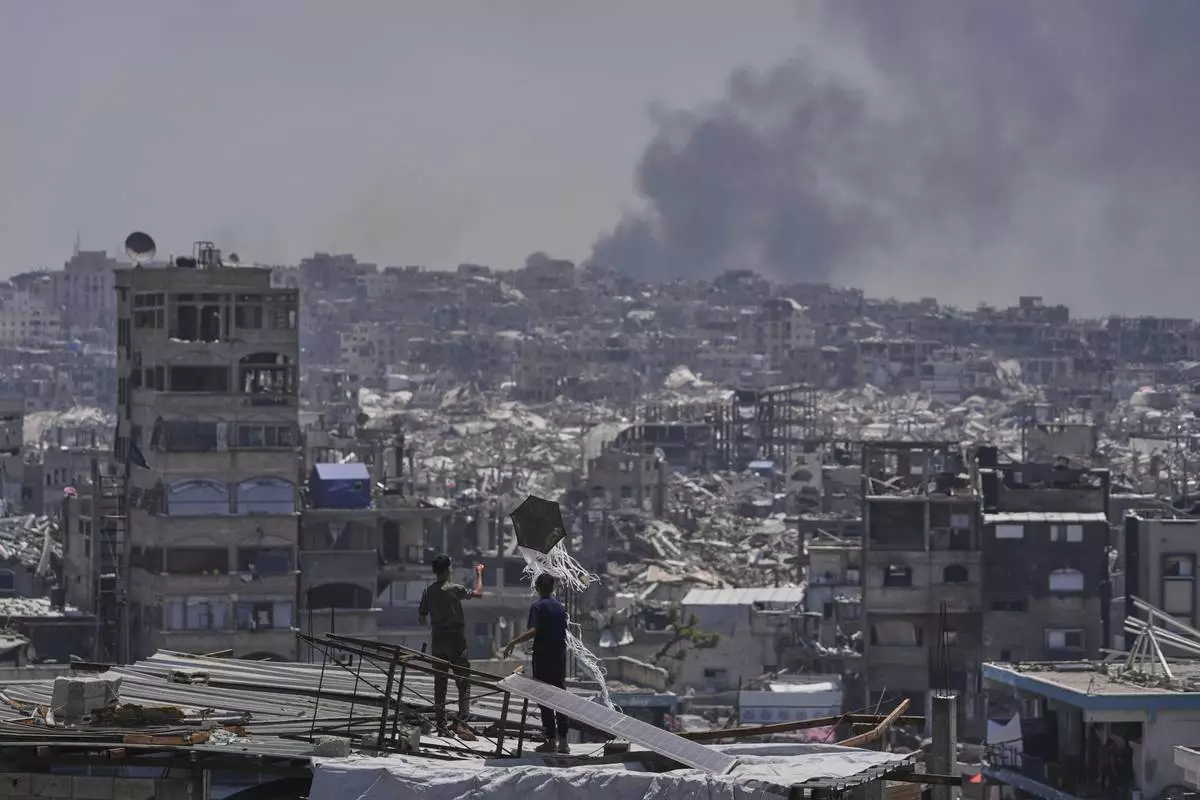
Palestinians look at smoke rises following an Israeli airstrike near Jabalia, northern Gaza Strip, Friday, May 16, 2025. (AP Photo/Jehad Alshrafi)
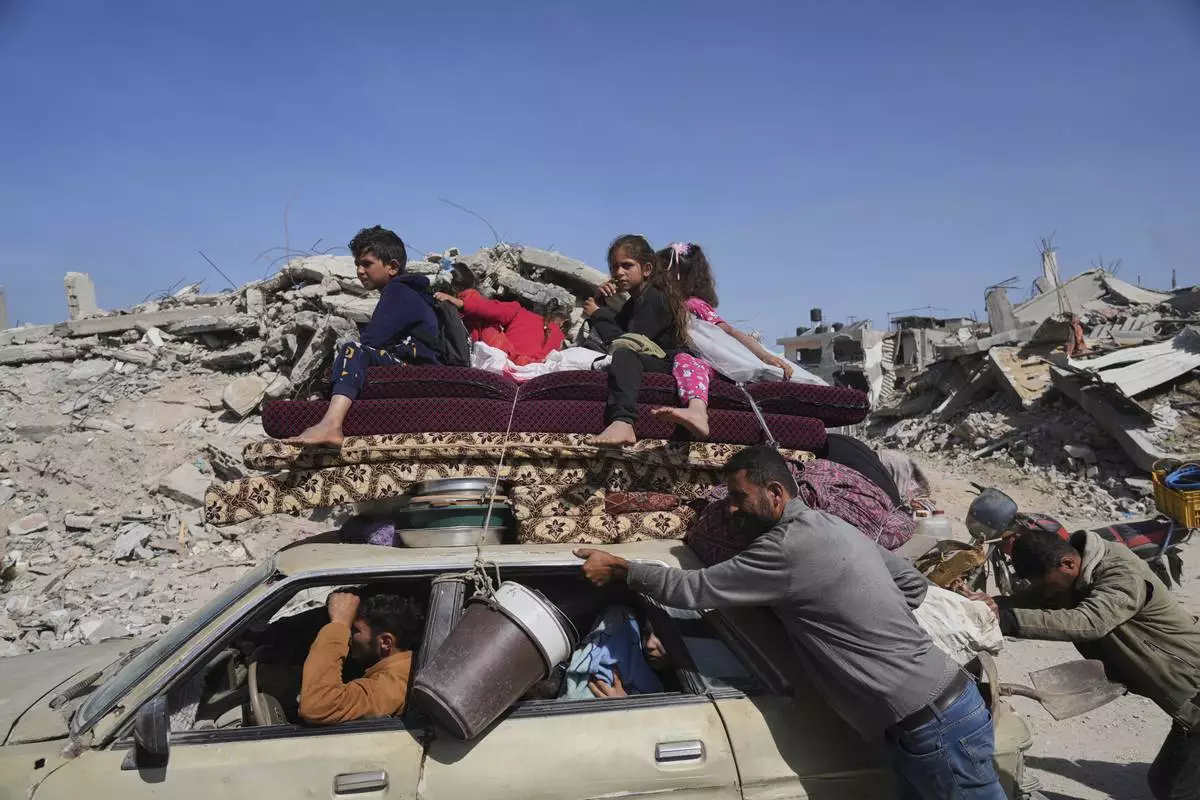
Displaced Palestinians fleeing Beit Lahia amid ongoing Israeli military operations in the Gaza Strip arrive in Jabalia, northern Gaza, on Friday, May 16, 2025. (AP Photo/Jehad Alshrafi)
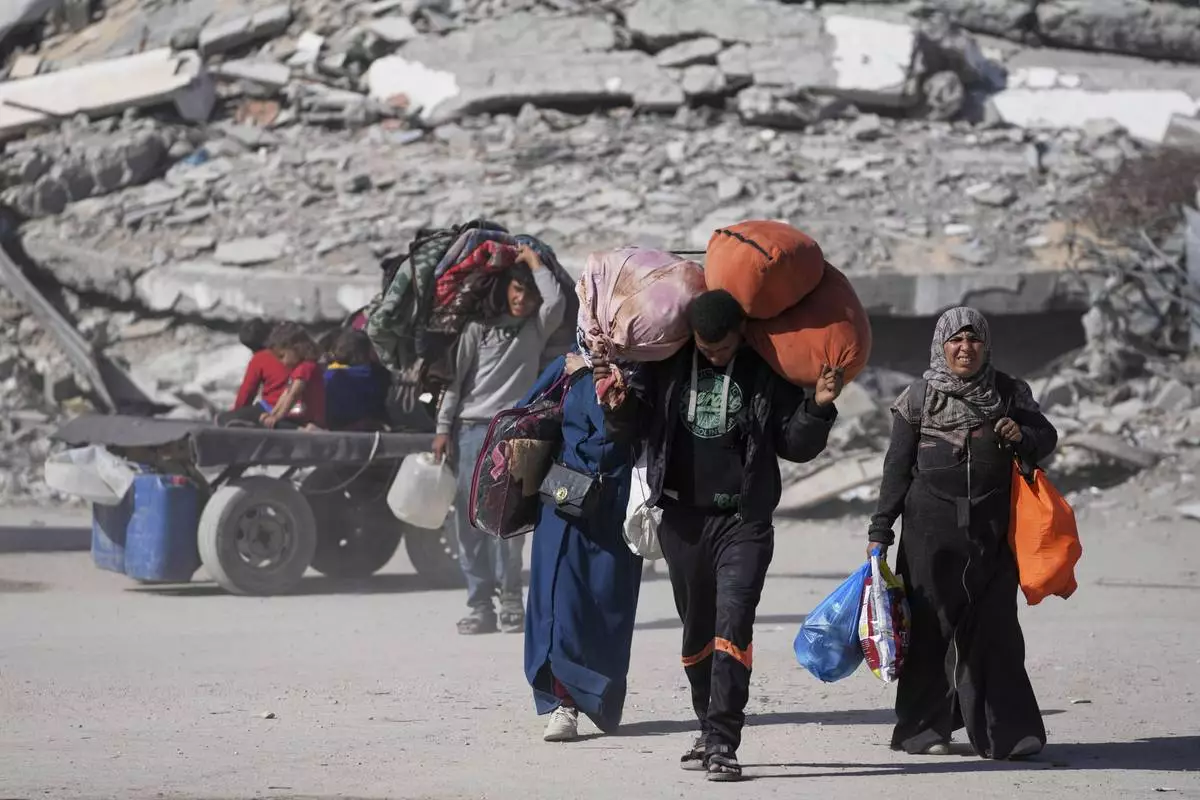
Displaced Palestinians fleeing Beit Lahia amid ongoing Israeli military operations in the Gaza Strip arrive in Jabalia, northern Gaza, on Friday, May 16, 2025. (AP Photo/Jehad Alshrafi)
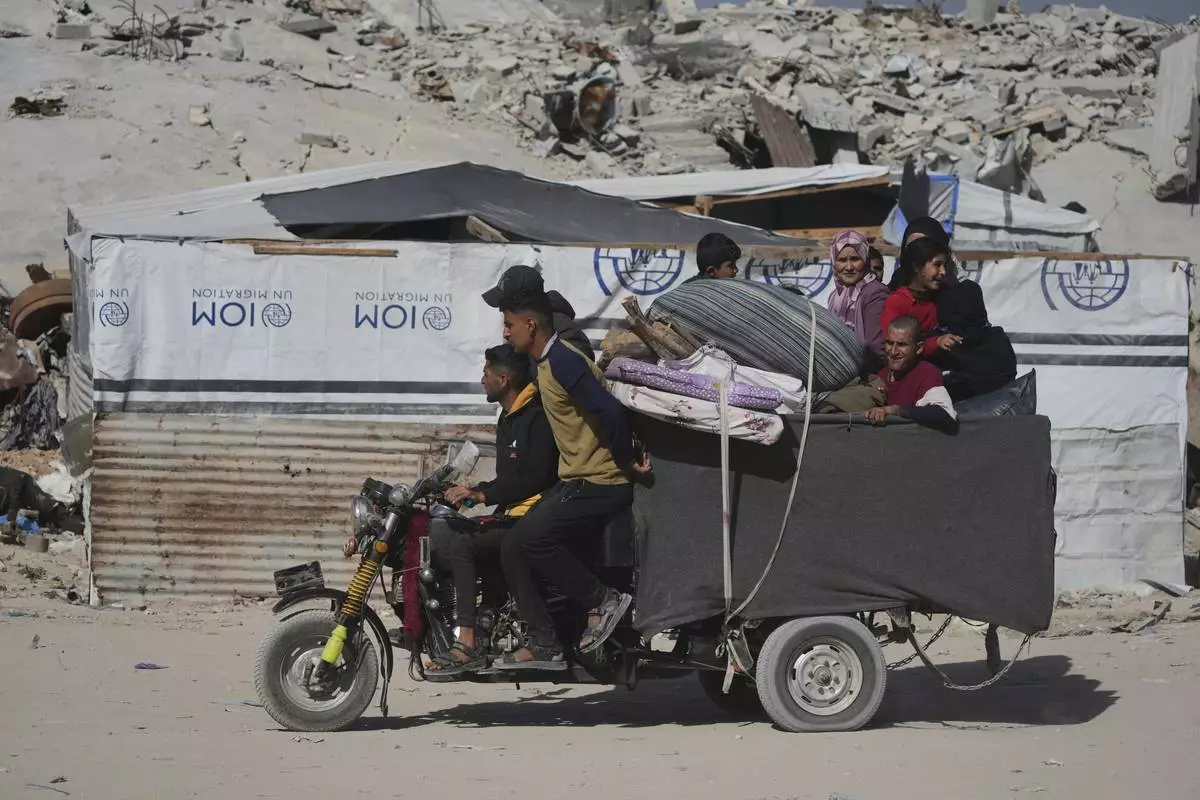
Displaced Palestinians fleeing Beit Lahia amid ongoing Israeli military operations in the Gaza Strip arrive in Jabalia, northern Gaza, on Friday, May 16, 2025. (AP Photo/Jehad Alshrafi)
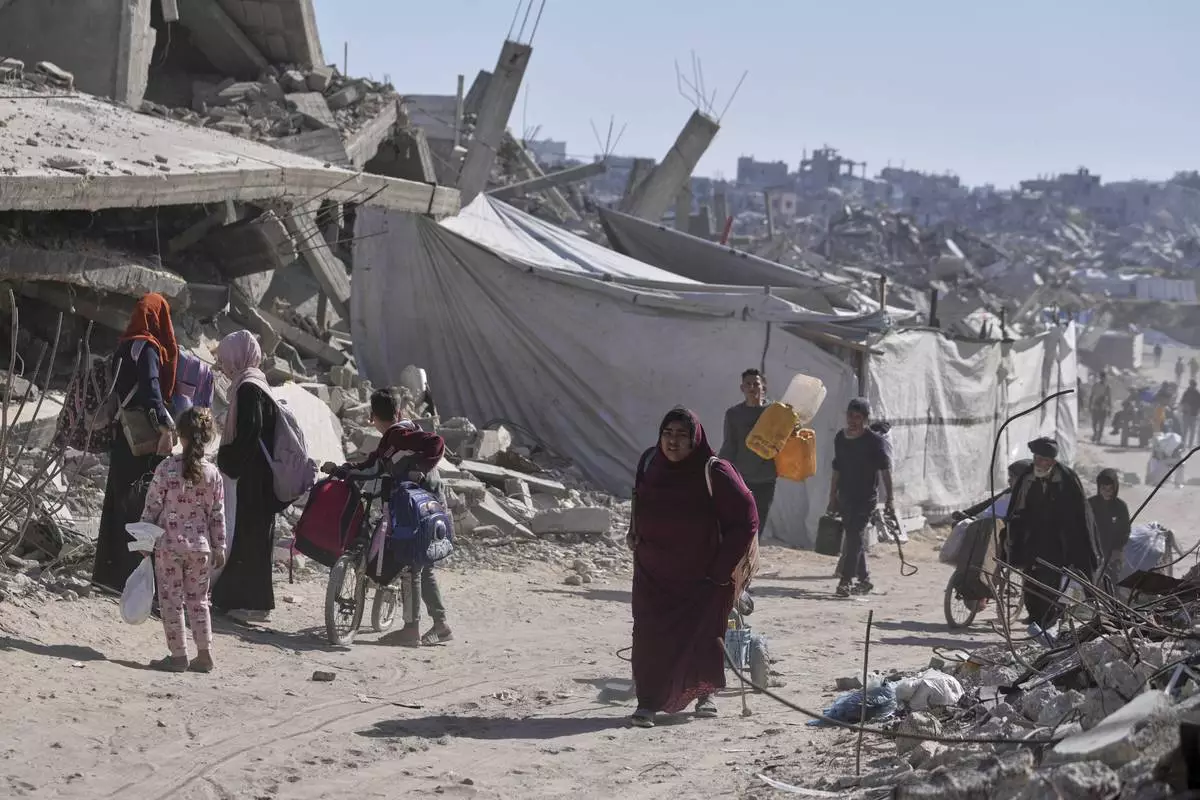
Displaced Palestinians fleeing Beit Lahia amid ongoing Israeli military operations in the Gaza Strip arrive in Jabalia, northern Gaza, on Friday, May 16, 2025. (AP Photo/Jehad Alshrafi)
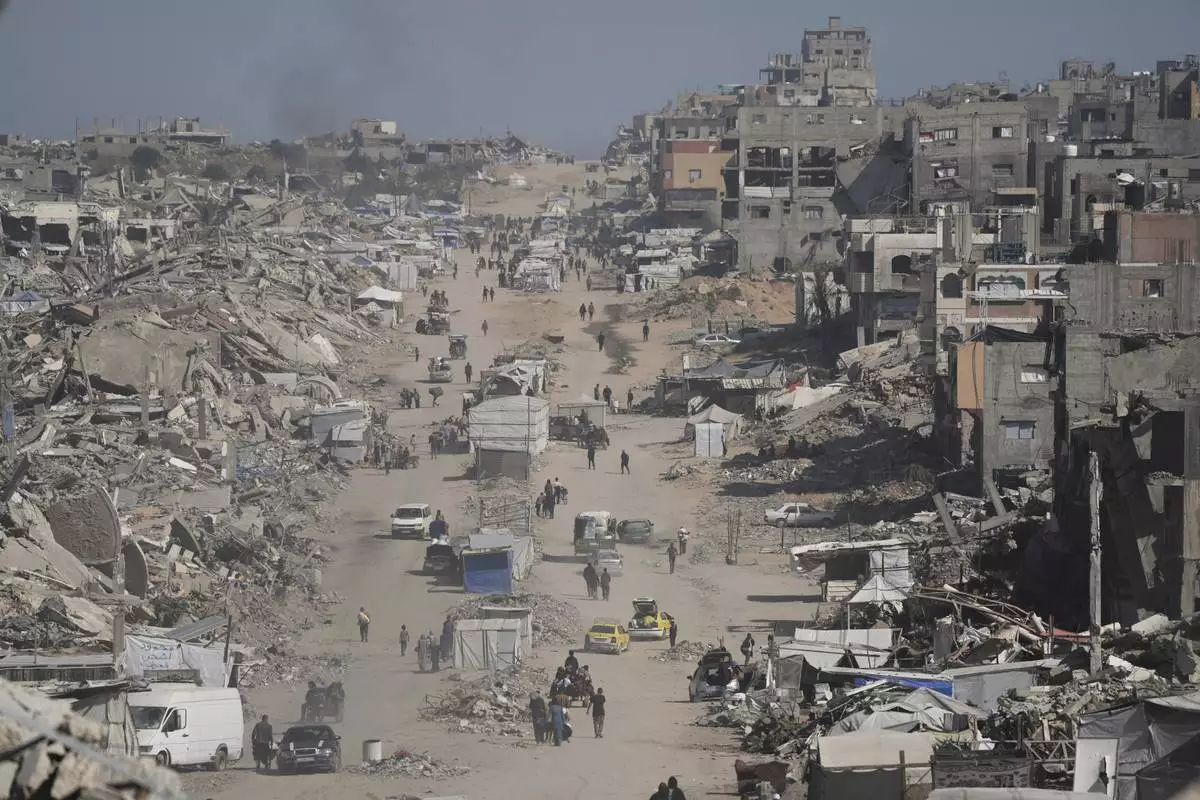
Displaced Palestinians fleeing Beit Lahia amid ongoing Israeli military operations in the Gaza Strip arrive in Jabalia, northern Gaza, on Friday, May 16, 2025. (AP Photo/Jehad Alshrafi)

Palestinians struggle to get donated food at a community kitchen in Jabalia, northern Gaza Strip, Thursday, May 15, 2025. (AP Photo/Jehad Alshrafi)
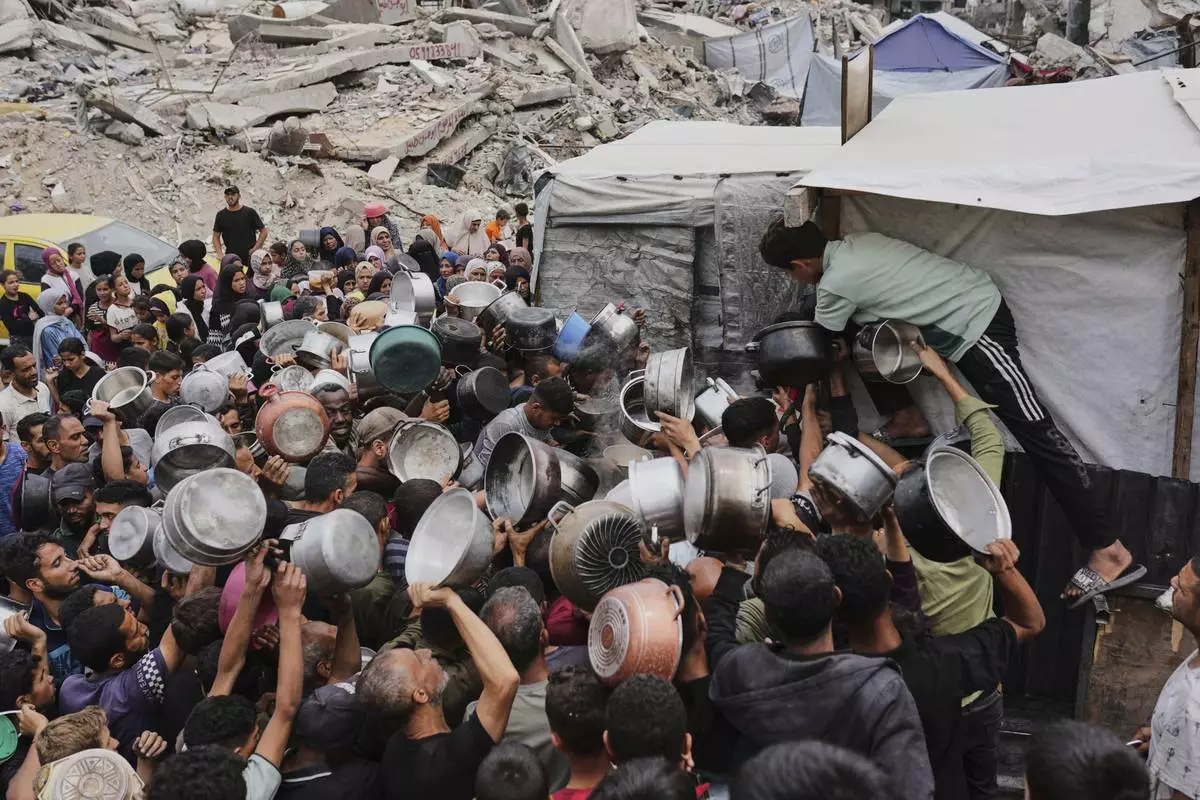
Palestinians struggle to get donated food at a community kitchen in Jabalia, northern Gaza Strip, Thursday, May 15, 2025. (AP Photo/Jehad Alshrafi)
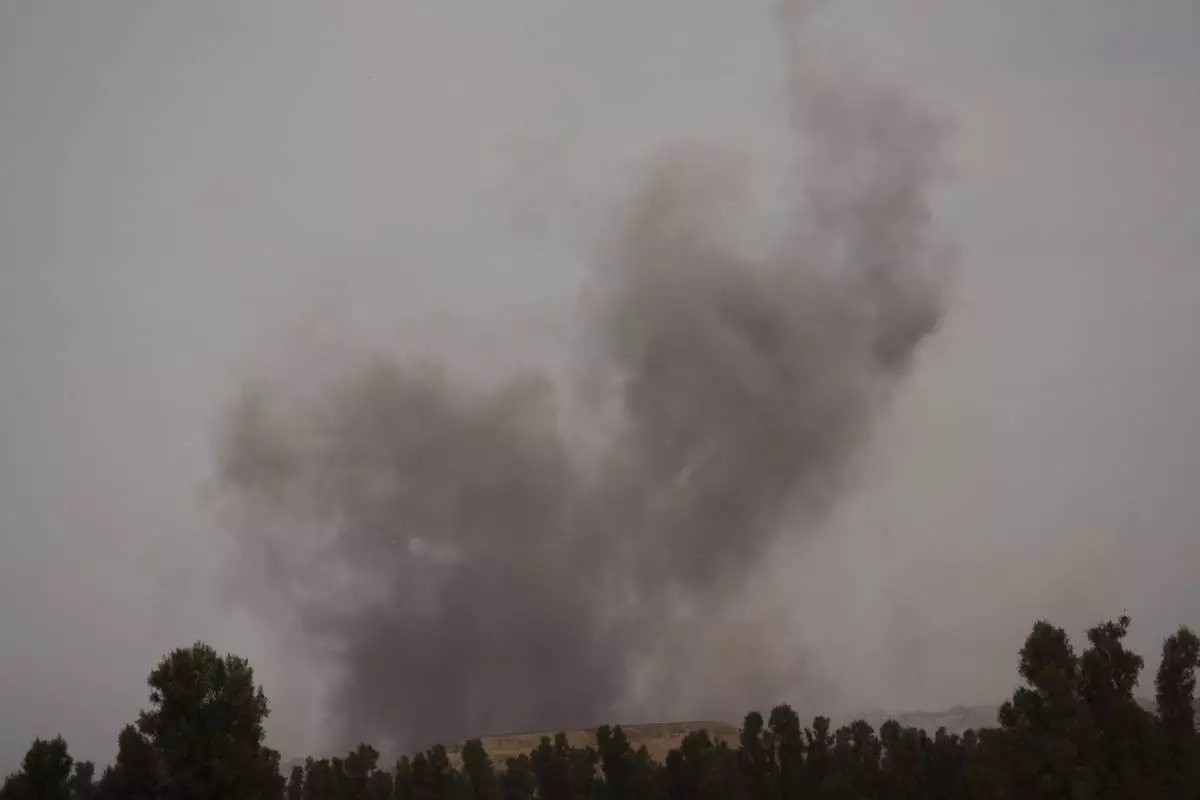
Smoke rises following an Israeli airstrike in the Gaza Strip, as seen from southern Israel, Thursday, May 15, 2025. (AP Photo/Ariel Schalit)

Palestinians struggle to get donated food at a community kitchen in Jabalia, northern Gaza Strip, Thursday, May 15, 2025. (AP Photo/Jehad Alshrafi)
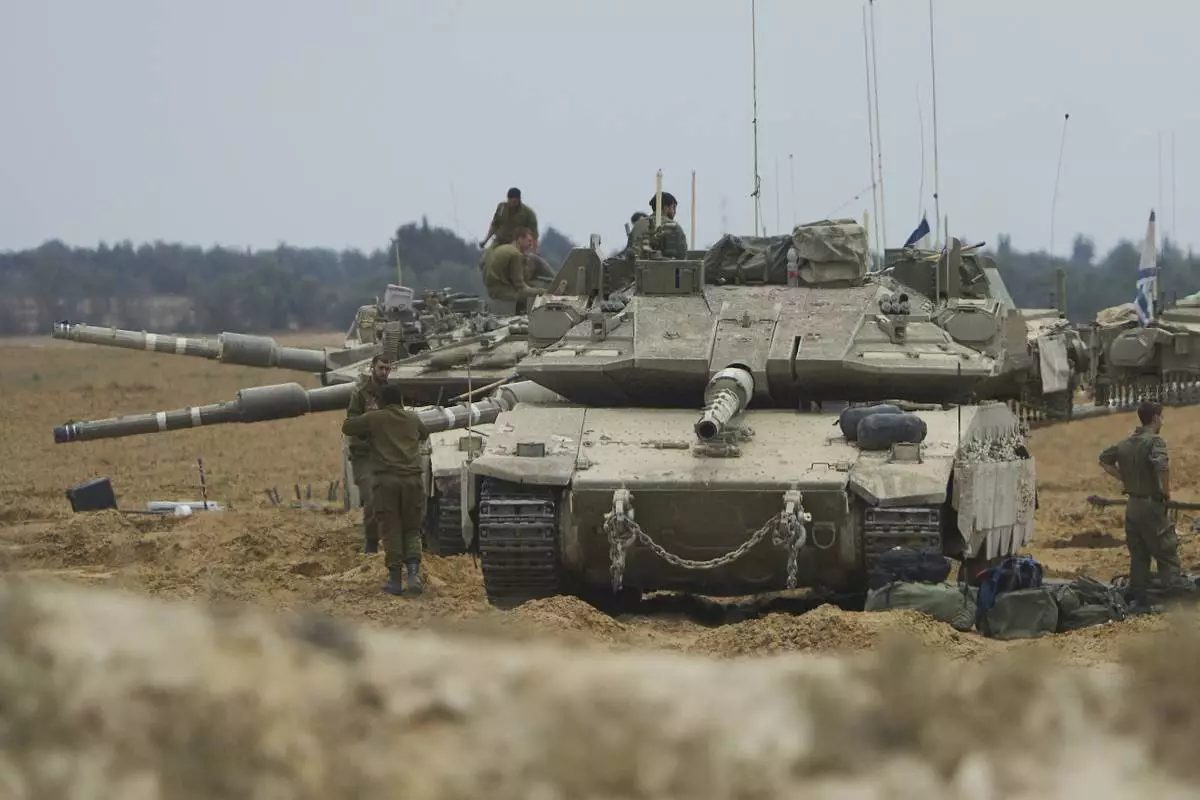
Israeli soldiers work on tanks and APCs at a staging area near the border with the Gaza Strip, in southern Israel, Thursday, May 15, 2025. (AP Photo/Ariel Schalit)


















